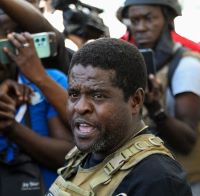News
Haiti editor in hiding since story questioning Reuters' gifts to gang leader
Thursday 21 November 2024

The editor-in-chief of a Port-au-Prince based news site has been living in hiding since a notorious Haitian gang leader threatened to "come for him" over a story criticizing Reuters journalists for giving him balaclavas, bottles of alcohol and cigarettes.
In the September 18 article for AyiboPost, Widlore Mérancourt described how Jimmy “Barbecue” Chérizier posted on his WhatsApp channel on September 14 a video, which has since been removed, bragging about the gifts from a Reuters photographer and reporter.
Mérancourt questioned the ethics of making gifts to Chérizier, who heads an alliance of nine gangs called the G9 Family. The United States and the United Nations have sanctioned him for alleged human rights atrocities in Haiti and destabilizing the country.
In response to the story, Chérizier threatened Mérancourt, saying in a September 25 video: “I’m coming for you. Mark my words: there are people you don’t want to mess with. You could be in your bathroom and a car could come crashing into you,” the Committee to Protect Journalists (CPJ) reported.
In an emailed response to questions, Mérancourt said that since receiving the threat, he had deleted his X (Twitter) and Instagram accounts and was “essentially living in hiding”.
“However, I remain committed to doing my job. It is more important than ever to document the staggering levels of death, displacement, and suffering happening in Haiti today,” Mérancourt told The Baron.
He reported in his September 18 story that the Reuters journalists had fled from Haiti after Chérizier’s September 14 video.
Reuters told The Baron that it “has a strict code of conduct to which all of its journalists must adhere. As soon as we became aware of this incident, we investigated it. This incident violated our code of conduct and we took appropriate action. We deeply regret this lapse in judgement.”
A spokesperson would not comment on what the action was or give any further details, but at least one of the journalists appears to have returned to work.
Mérancourt said he had contacted Reuters “for an update on their investigation into the two journalists. So far, they have not responded. Additionally, they have not reached out to offer any support."
The Reuters spokesperson told The Baron: “Mr. Merancourt last contacted Reuters on October 8, and we responded to him on October 9. We are unaware of subsequent contacts.” They gave no further details.
Mérancourt said the threats by Chérizier were serious. “He is leading a war in Haiti against journalism that challenges him. He has called for local journalists like me to be hunted down and killed.
“As his gangs attack institutions and take countless lives, the demand for reliable journalism has never been greater. This is why it is essential for journalists working in Haiti to adhere to the highest standards to maintain public trust.”
In its September 30 report, CPJ said it was very concerned about the threats against Mérancourt. “Haitian journalists are already working in unimaginably difficult conditions,” CPJ U.S., Canada, and Caribbean Program Coordinator Katherine Jacobsen said. “They should not be intimidated simply for doing their jobs and covering matters of public importance.”
CPJ classes the Caribbean nation as one of the most dangerous countries in the world for the media and ranks it third on its 2023 Global Impunity Index, which spotlights countries where the killers of journalists are most likely to go free.
Chérizier’s leading role in deadly violence in Haiti is highlighted in the UN Security Council’s 2022 sanction. It said he planned and took part in a 2018 attack against civilians in the La Saline neighbourhood of Port-au-Prince, in which 71 people were killed, 400 buildings destroyed and at least seven women raped by gang members. His actions have directly contributed to the economic paralysis and humanitarian crisis in Haiti, it said.
Human rights groups in Haiti expressed outrage at the gifts reportedly made by the Reuters journalists. In its September 18 story, AyiboPost quoted lawyer Samuel Madistin, of Fondasyon Je Klere, a nonprofit that seeks to transform Haiti from a failed to a modern state, as saying: “It’s a slap in the face to the women raped, the people kidnapped, and those tortured by the armed groups."
(Photo shows Jimmy Chérizier)
■
- « Previous
- Next »
- 18 of 2177